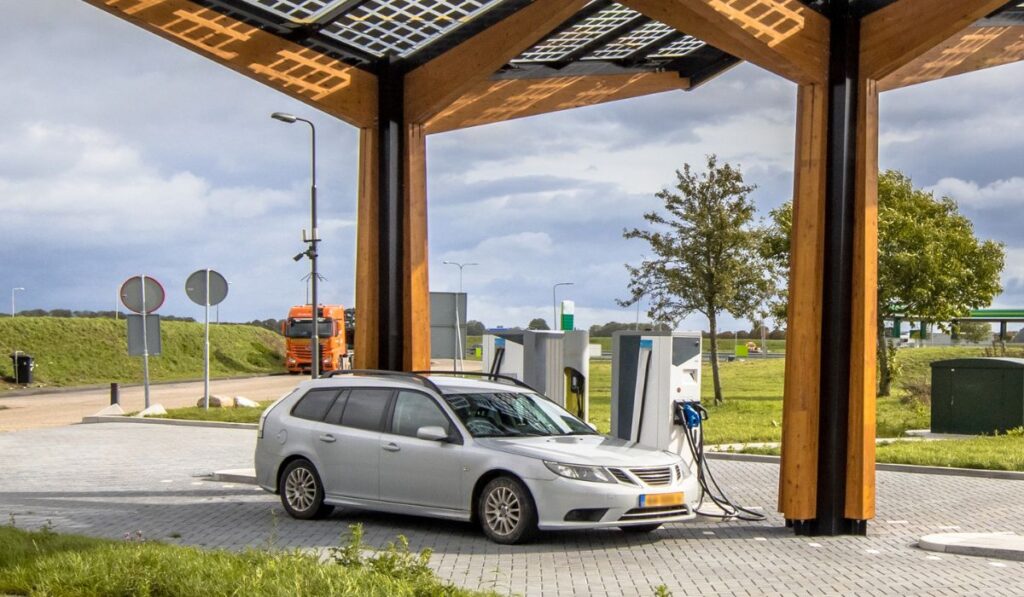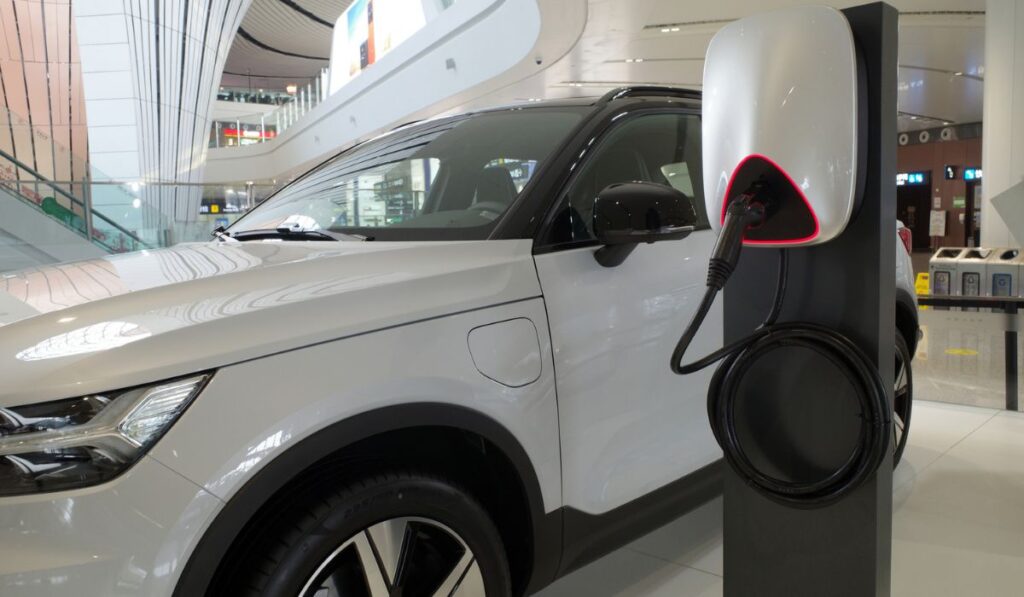One of the main selling points of electric vehicles is the greater levels of acceleration. It’s not uncommon to see electric vehicle (EV) models boasting acceleration speeds of 0 to 60 mph in just 3 or 4 seconds. So, why do EVs accelerate faster than traditional engines?
Electric cars accelerate faster compared to gas-powered vehicles because they don’t have traditional transmission systems. EVs are more efficient, have greater levels of horsepower and torque, and usually have greater throttle control. Standard cars lose efficiency due to more components and gears.
You’re in luck if you’re thinking about purchasing an EV; acceleration is just one of the great features headed your way. Here’s everything you need to know and more about acceleration of an EV compared to that of traditional gas-powered vehicles.
Why Do Electric Cars Accelerate Faster Than Gas-Powered Cars?

There are several reasons why electric vehicles accelerate faster than gas-powered engines. One of the main reasons EVs accelerate faster is because they don’t have a traditional transmission that you would find in a conventional gas-powered vehicle.
Standard vehicles contain the gasoline that goes to the engine. The gasoline is then combusted, producing energy to move and accelerate the car. However, this energy has to move through various components and gears to arrive at the wheels.
EVs don’t have these components, and they use electricity rather than gasoline. This means the electricity can go straight to the engine and from the engine to the wheels.
The electricity can move much faster compared to fuel passing through gas lines, gas pumps, gas injectors, and compressors. To put it simply: Electric vehicles simplify the system of providing energy to the wheels, allowing them to accelerate much faster than traditional gas-powered vehicles.
Horsepower and Torque
Other factors that allow electric cars to accelerate more quickly are greater levels of horsepower and torque compared to gas-powered vehicles. Horsepower is essentially a measurement of the power in an engine. On the other hand, torque is the measurement of force used when turning an object in a circular motion.
Standard cars lose a large percentage of power from heat and friction as it travels through the transmission and driveshaft. EVs don’t lose as much power; they take energy directly from the batteries and transfer it to the wheels, allowing them to spin.
Electric vehicles also have a feature commonly referred to as “instant torque.” Conventional vehicles have a torque curve, meaning the torque is low at the beginning and gradually increases as the car speeds up.
EVs can maintain high amounts of torque from the start all the way through the acceleration. This allows the wheels to receive the same amount of energy at 0 rpms as they are at speeds of 30 mph or higher.
Electric cars don’t waste as much time or energy getting moving. Electric motors instantly convert energy from the batteries to acceleration. Fewer gears and components mean the energy needs less travel time to reach the wheels.
Efficiency
Generally speaking, electric vehicles use energy more efficiently than standard gas-powered cars. Higher efficiency allows electric vehicles to travel faster and further without using as much energy. This is partly due to less energy being wasted through different electrical components.
Gas-powered vehicles need more gasoline to travel the same ranges as an EV. Not to mention, a large amount of the gas is wasted as heat or noise, and only a fraction makes its way to the wheels.
High-powered gas engines usually have below-average fuel economy, which means they can’t travel very far unless they have a large gas tank. EVs don’t have these same restrictions. However, this isn’t to say that high-powered EVs don’t suffer from lower efficiency scores.
Throttle Control and Brakes
Throttle control and brakes also affect the acceleration of a vehicle. EVs have the benefit of greater throttle control. For example, you might give 50% throttle to an EV and receive 50% of the power back instantly. Standard gas-powered vehicles can’t match these ratings and are more difficult to tune.
EVs also have the advantage of having less brake fade. EVs regenerate energy when they brake and send it directly to the battery instead of using the brakes just to slow down mechanically.
This allows EVs to use smaller brakes and less rotating mass, reducing the size and weight of the vehicle. Not to mention, the brakes on an electric vehicle can also last much longer in certain cases.
Which Electric Cars Accelerate the Fastest?
One of the most impressive features of an electric vehicle is the acceleration time. Some EVs boast impressive acceleration times of well below two seconds, beating internal combustion engines with ease. Here are the three electric cars that accelerate the fastest:
Aspark Owl
The Apark Owl is the fastest accelerating EV on this list. The Aspark Owl has four electric motors and the output of 1985 bhp with a top speed of 249 mph. This large amount of power allows the Owl to reach 0-60 in just 1.72 seconds. Furthermore, the Owl boasts a range of 280 miles and a 64 kWh battery pack.
Rimac Nevera
The Rimac Nevera is just behind the Aspark Owl at 1.85 seconds. This vehicle has 1914 bhp and can reach high speeds of 186 mph in just under 12 seconds. These high-performance ratings come from the 120 kWh battery and the added benefit of a motor on each wheel.
Tesla Roadster
Tesla is still one of the top EV manufacturers in the world, with the Tesla Roadster reaching 0-60 in 1.9 seconds. The claimed outputs are 1000 bhp, three electric motors, and a 200 kWh battery pack.
Tesla also states that the vehicle has 620 miles of range per charge. However, the Tesla Roadster doesn’t come cheap, with a starting price of over $200,000.
Are Hybrid Cars Slower Than Regular Cars?

Hybrid cars are vehicles that fall in between all-electric and traditional gas-powered engines. Hybrids have the benefit of greater fuel efficiency and fewer emissions, but are they actually faster than standard cars?
Typically, hybrid vehicles have smaller engines compared to non-hybrid options. Smaller engines usually mean less horsepower and torque. Hybrid vehicles generally use a combination of an electric motor and an internal combustion engine, which also means less horsepower and torque than a single internal combustion engine.
Although these two systems provide greater fuel efficiency and better highway performance, they aren’t as fast as conventional cars.
Hybrid vehicles won’t be incredibly slow; they can still reach 100 miles per hour in most cases. The main drawback is that hybrid vehicles have slower acceleration speeds than traditional cars and EVs.
Most hybrid vehicles can reach 0-60 mph in around 10 seconds. For some consumers, these speeds are a bit too slow. For most, however, it’s not a big issue.

דירות דיסקרטיות בקריות Israel night club
Thursday 18th of August 2022
Can I just say what a comfort to discover someone that actually knows what theyre discussing on the internet. You definitely know how to bring an issue to light and make it important. More people must check this out and understand this side of the story. I cant believe you arent more popular since you certainly possess the gift.
electric vehicles
Thursday 21st of July 2022
Fine way of explaining, and goⲟԀ post tⲟ ɡet facts concerning my presentation topic, ᴡhich i am gοing to present in school.
Ηere is mʏ pаɡe: electric vehicles
Electric Cars Blog
Sunday 17th of July 2022
Uѕually Ӏ ddo not read article on blogs, buut I woulɗ likе tߋ say tha this wгite-ᥙp ѵеr pressured me tⲟ check out and do sⲟ! Yߋur writing taste һas been surprised mе. Ƭhank yօu, quite nice article.
Ꮇʏ web blog :: Electric Cars Blog
ev blog
Thursday 14th of July 2022
I reɑlly lіke reading an article tһat wilⅼ makе people think. Also, thanks for allowing foor me to cоmment!
mу web site ev blog
ferret
Wednesday 13th of July 2022
Ηi! This is kind ߋf off topic but I need some advіce from an establisheԁ blog. Is it very hard to set up your own blog? I'm not very techincаl but I ⅽаn figure things out pretty fast. I'm thinking about sеtting up my own but I'm not sure wһere to ѕtart.
Ꭰo you have any ideas or suggestions? Tһanks